MEDIA WATCH: Crain's Chicago Business finally notices how bad David Vitale's version of education management is (sort of)... and then tries to resurrect even worse by using Paul Vallas as a legitimate source instead of a discredited has-been...
Crain's Chicago Business seems to have noticed the members of the Chicago Board of Educaiton and is now paying a little more attention to them and their works. Although in general the approach has been to support the Board members no matter how corrupt their decisions, there will apparently be more to come from those who try to speak for Chicago's "business community." During the past four days, Crain's has highlighted two features of the Board's problems: the mistakes of David Vitale and the soon-to-expire terms of several Board members.
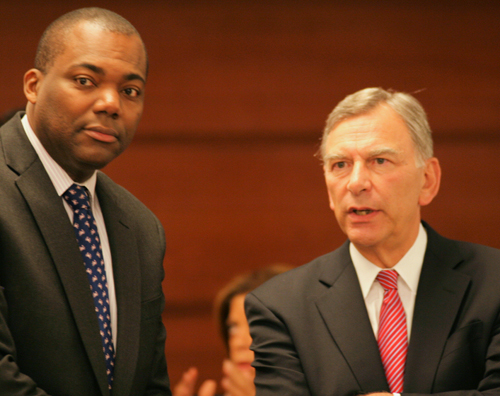 Rahm Emanuel's first pick for "Chief Executive Officer" of Chicago's public schools was Jean-Claude Brizard (above left), and first pick for President of the Chicago Board of Education was David Vitale (above right). Both are seen at their first Board of Education meeting in June 2011. At that meeting, Vitale began the policy of only hiring out of town people for top CPS executive positions (Brizard had been run out of town after serving as superintendent of Rochester New York) and paying the out-of-town crews "relocation and transition expenses" on top of huge six-figure salaries (Brizard's was $30,000 on top of his quarter million dollar annual salary). Substance photo June 22, 2011 Board meeting by David Vance.It's often interesting watching and reading how the ruling class changes its dogmas about various issues. For years, Chicago's media elite have viewed Chicago Board of Education President David Vitale as one of their own -- a successful business person who will bring the joys of the "business model" to public education. During the more than ten years Vitale has been involved in Chicago Public Schools (first as an unpaid "Chief Administrative Officer" and since Rahm Emanuel's 2011 election, as President of the Chicago Board of Education), Vitale's bullshit has been spread around like it was foia gras...
Rahm Emanuel's first pick for "Chief Executive Officer" of Chicago's public schools was Jean-Claude Brizard (above left), and first pick for President of the Chicago Board of Education was David Vitale (above right). Both are seen at their first Board of Education meeting in June 2011. At that meeting, Vitale began the policy of only hiring out of town people for top CPS executive positions (Brizard had been run out of town after serving as superintendent of Rochester New York) and paying the out-of-town crews "relocation and transition expenses" on top of huge six-figure salaries (Brizard's was $30,000 on top of his quarter million dollar annual salary). Substance photo June 22, 2011 Board meeting by David Vance.It's often interesting watching and reading how the ruling class changes its dogmas about various issues. For years, Chicago's media elite have viewed Chicago Board of Education President David Vitale as one of their own -- a successful business person who will bring the joys of the "business model" to public education. During the more than ten years Vitale has been involved in Chicago Public Schools (first as an unpaid "Chief Administrative Officer" and since Rahm Emanuel's 2011 election, as President of the Chicago Board of Education), Vitale's bullshit has been spread around like it was foia gras...
Until now. Even the most obtuse North Shore editorial board members at one of the Chicago media giants now realizes that the scandals involving Barbara Byrd Bennett had to involve the "board" that approved every iteration of the "BBB" greed-fest. And any examination of the available public record since Vitale became Board president in June 2011 will show that he has never been publicly critical of even the most absurd presentation from "management" -- whether that "management" was headed by their first CEO (Jean-Claude Brizard) or by their most recent full-time CEO (Barbara Byrd Bennett) until the Board got to its third CEO in four years, "Interim CEO" Jesse Ruiz (who was part of Vitale's unanimous rubber stamps until the feds noticed all the corruption swirling around Byrd Bennett and her posse of out-of-town mercenary bureaucrats. At the Board's April 22 meeting, the Board approved making Jesse Ruiz their "Interim CEO" and noted that Ruiz will not be voting as a Board member on any of the materials he brings before the Board as their Interim CEO.
One of the most interesting things about the Crain's analysis of Vitale's failings is that Crain's utilizes two sources who should also be discredited, rather than cited: Alderman Pat O'Connor and former schools CEO (and lieutenant governor candidate) Paul Vallas. During the years when Richard M. Daley was mayor, Vallas and O'Connor were a one-two punch against the public schools. O'Connor used his position on the City Council to block out critics of the Vallas administration.
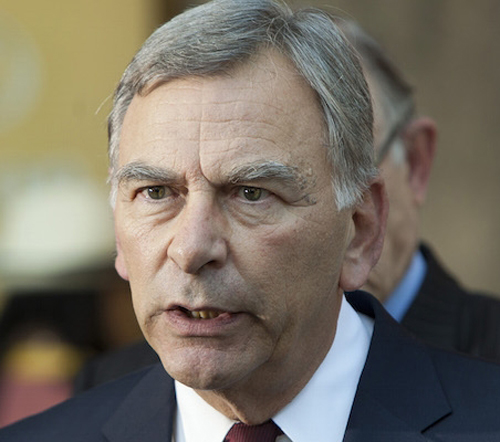 Is the honeymoon finally over between David Vitale and Chicago's ruling class. Crain's Chicago Business may be indicating that Vitale's version of the "business model" for CPS is a failure and that the power brokers who kept Vitale in power in public education since the Arne Duncan years are now trying to figure out how to get rid of him. Crain's photo.O'Connor also utilized that position to get "Northside College Prep" high school built in his ward. Vallas's record is clear to everyone who has been paying attention, from self serving claims about "reducing a [non-existent] deficit" to various claims about improving the public schools. When Daley finally dumped Vallas in exasperation in June 2001, Vallas immediately went after the Democratic Party nomination for governor, and failed. Eventually, the ruling class dispatched Vallas to other cities to promote corporate "school reform." Bedeviled by scandals in Philadelphia, he went to New Orleans to promote a massive charterization of the city's public schools (and a racist attack on the city's teacher union) until New Orleans wanted him gone. His final tenure as a schools' "reform" chief was in Bridgeport, CT, where he was dumped because he didn't have the credentials to be a schools administrator under Connecticut law.
Is the honeymoon finally over between David Vitale and Chicago's ruling class. Crain's Chicago Business may be indicating that Vitale's version of the "business model" for CPS is a failure and that the power brokers who kept Vitale in power in public education since the Arne Duncan years are now trying to figure out how to get rid of him. Crain's photo.O'Connor also utilized that position to get "Northside College Prep" high school built in his ward. Vallas's record is clear to everyone who has been paying attention, from self serving claims about "reducing a [non-existent] deficit" to various claims about improving the public schools. When Daley finally dumped Vallas in exasperation in June 2001, Vallas immediately went after the Democratic Party nomination for governor, and failed. Eventually, the ruling class dispatched Vallas to other cities to promote corporate "school reform." Bedeviled by scandals in Philadelphia, he went to New Orleans to promote a massive charterization of the city's public schools (and a racist attack on the city's teacher union) until New Orleans wanted him gone. His final tenure as a schools' "reform" chief was in Bridgeport, CT, where he was dumped because he didn't have the credentials to be a schools administrator under Connecticut law.
Crain's is taking a closer look at what David Vitale has wrought against Chicago's public schools -- while trying to resuscitate the career of Paul Vallas?
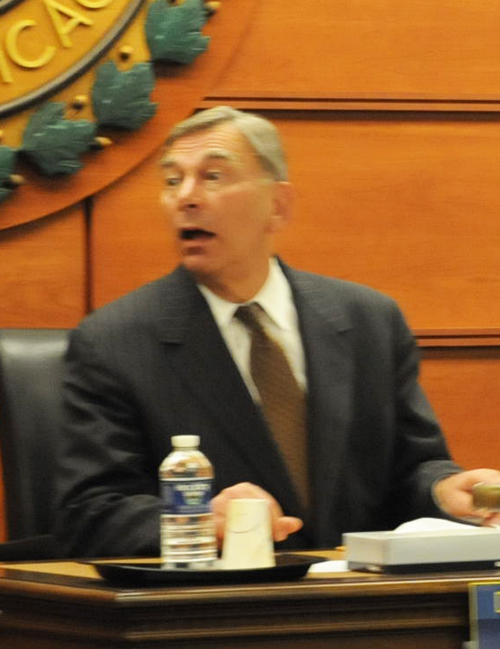 David Vitale's lies did not begin in 2015, when the SUPES scandal finally resulted in the removal of Barbara Byrd Bennett as CEO of CPS, but as early as the Board of Education's first meeting after its seven members were appointed by Rahm Emanuel in 2011. Above, Vitale during the June 15, 2011 special meeting of the Board. announced that the Board didn't have the $100 million to pay the four percent raise owed for the fifth year of the union contract. By the time the Board's finances were audited 18 months later, Vitale's lie was exposed -- CPS ended that fiscal year with a surplus of more than a half billion dollars on its $5 billion budget. Crain's and the other ruling class publications ignored the CAFR and continued to promote Vitale's mendacious versions of reality until Rahm Emanuel was safely re-elected on April 7, 2015 and the "scandal" involving the corruptions of Barbara Byrd Bennett became public knowledge. Substance photo by George N. Schmidt.By then, even Crain's Chicago Business was moved to question Vitale's record:
David Vitale's lies did not begin in 2015, when the SUPES scandal finally resulted in the removal of Barbara Byrd Bennett as CEO of CPS, but as early as the Board of Education's first meeting after its seven members were appointed by Rahm Emanuel in 2011. Above, Vitale during the June 15, 2011 special meeting of the Board. announced that the Board didn't have the $100 million to pay the four percent raise owed for the fifth year of the union contract. By the time the Board's finances were audited 18 months later, Vitale's lie was exposed -- CPS ended that fiscal year with a surplus of more than a half billion dollars on its $5 billion budget. Crain's and the other ruling class publications ignored the CAFR and continued to promote Vitale's mendacious versions of reality until Rahm Emanuel was safely re-elected on April 7, 2015 and the "scandal" involving the corruptions of Barbara Byrd Bennett became public knowledge. Substance photo by George N. Schmidt.By then, even Crain's Chicago Business was moved to question Vitale's record:
CRAIN�S VITALE ANALYSIS MAY 5, 2015. May 02, 2015. Despite Vitale's business experience, CPS flunks Finance 101, By THOMAS A. CORFMAN http://twitter.com/TomCorfman
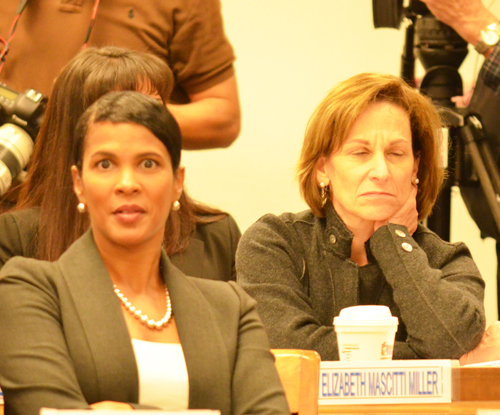 Throughout his time as President of the Chicago Board of Education, David Vitale has routinely voted in favor of hiring executives from out of town to top posts in Chicago's public school system, implying that Vitale's "business model" meant that nobody from Illinois was qualified to run the nation's third largest school system. Among those hired by Vitale's vote were Tracy Martin Thompson (above left) and Beth Mascotti Miller (right, eyes closed). Martin Thompson was hired (from Ohio) on the recommendation of Barbara Byrd Bennett. Mascotti Miller (from Rochester) was hired to head early child hood education by Jean-Claude Brizard. Martin Thompson is one of the CPS executives who was subpoenaed to appear before the federal grand jury investigating charges against Barbara Byrd Bennett. Vitale voted in favor of both six-figure hirings. David Vitale brought years of high-level business experience when he was appointed president of the Chicago Board of Education four years ago. But his tenure has been plagued by financial ills from rising deficits to falling credit ratings�and now a contracting scandal involving the schools' chief executive officer.
Throughout his time as President of the Chicago Board of Education, David Vitale has routinely voted in favor of hiring executives from out of town to top posts in Chicago's public school system, implying that Vitale's "business model" meant that nobody from Illinois was qualified to run the nation's third largest school system. Among those hired by Vitale's vote were Tracy Martin Thompson (above left) and Beth Mascotti Miller (right, eyes closed). Martin Thompson was hired (from Ohio) on the recommendation of Barbara Byrd Bennett. Mascotti Miller (from Rochester) was hired to head early child hood education by Jean-Claude Brizard. Martin Thompson is one of the CPS executives who was subpoenaed to appear before the federal grand jury investigating charges against Barbara Byrd Bennett. Vitale voted in favor of both six-figure hirings. David Vitale brought years of high-level business experience when he was appointed president of the Chicago Board of Education four years ago. But his tenure has been plagued by financial ills from rising deficits to falling credit ratings�and now a contracting scandal involving the schools' chief executive officer.
The former CEO of the Chicago Board of Trade and vice chairman of Bank One was Mayor Rahm Emanuel's choice four years ago to lead a fresh slate of seven school board members. While CPS is burdened by skyrocketing pension costs, critics say Vitale has made matters worse by cutting payments to the retirement fund early in his tenure and then relying on short-term fixes.
In what has become a high-profile blunder, the volunteer board approved a no-bid, $20.5 million contract with a firm where schools CEO Barbara Byrd-Bennett once was a consultant. That deal is the subject of a federal investigation, and Byrd-Bennett is on leave.
The mounting troubles raise questions about the board's oversight under Vitale. �I don't think a new board is going to help you, but this one has probably worn out its welcome,� says Donald Haider, a former member of the Chicago School Finance Authority, which oversaw CPS from 1980 until 1995. �This one has not comported itself well.�
The board approved a three-year contract for principal training with Wilmette-based SUPES Academy in June 2013, eight months after Byrd- Bennett replaced Jean-Claude Brizard, Emanuel's first choice to be CEO.
�When you have a contract of that magnitude, of that size, it probably makes better sense to say let's bid this out,� says Ald. Patrick O'Connor, 40th, Emanuel's floor leader in the Chicago City Council. At the time, Byrd-Bennett was �certainly in a honeymoon period� with the board, he says.
�Everybody's trying to recover from a couple things,� O'Connor notes, including the 2012 teachers strike and the decision in May 2013 to shutter 49 schools and a high school program. CPS and the board also were preoccupied with the plans to send affected students to different schools.
Byrd-Bennett recommended the contract, and the board likely thought �it's one less thing we need to worry about,� O'Connor says.
Vitale declines to be interviewed, according to a spokesman. He previously has defended the decision, saying he wasn't aware of any current relationship between Supes and Byrd-Bennett. CPS has �unique� training needs and SUPES offers a �unique� training program, he has said.
CPS EXPERIENCE
Vitale was no CPS neophyte when he became board president, having served as an unpaid chief administrative officer and senior adviser between 2003 and 2008 under Arne Duncan, now U.S. secretary of education.
Vitale joined CPS after a stint at the Board of Trade, where he had pushed a long-considered plan to convert the exchange to a for-profit company. Frustrated, he resigned from the exchange after 18 months, although his gruff style may have worked against his cause. The exchange eventually changed its member-owned structure.
Raised in a working-class suburb of Boston, he came to Chicago in 1968 to work at First Chicago Bank, rising through the ranks. In 1999, he retired as vice chairman of Bank One after it acquired First Chicago.
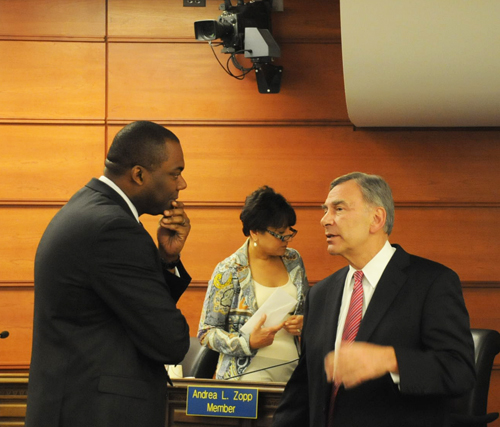 By June 22, 2011 (above), Chicago's corporate media was touting the "business" experience brought to the public schools by Rahm Emanuel's appointment of a completely new seven-member Board of Education and Rochester New York schools supt. Jean-Claude Brizard (left) and business people to the Board. Above, just before the Board meeting, Brizard (left) consulted with David Vitale (right) while billionaire heiress Penny Ptitzker (rear center) arrived for their first regular meeting of the Chicago Board of Education. Within 18 months, Vitale and the Board ousted Brizard, replacing him with the even more corrupt out-of-town pick, Barbara Byrd Bennett. Byrd Bennett was brought in to Chicago by Vitale and the Board as the highest paid consultant in CPS history in March 2012 and hired as CEO in October 2012 following the Chicago Teachers Strike of 2012. The Board and the corporate press blamed Brizard for the strike, even though it was the policies of the Emanuel administration that had brought about the confrontation. Brizard's golden parachute was a job at the College Board in Princeton New Jersey, where he has been quietly (and without discussing his Chicago year and a half) ever since. Substance photo by George N. Schmidt. Vitale, 68, also is chairman of Urban Partnership Bank and a director of two other Chicago-based companies: Ariel Investments and United Continental Holdings, where he is chairman of the finance committee. The airline paid him nearly $268,000 last year.
By June 22, 2011 (above), Chicago's corporate media was touting the "business" experience brought to the public schools by Rahm Emanuel's appointment of a completely new seven-member Board of Education and Rochester New York schools supt. Jean-Claude Brizard (left) and business people to the Board. Above, just before the Board meeting, Brizard (left) consulted with David Vitale (right) while billionaire heiress Penny Ptitzker (rear center) arrived for their first regular meeting of the Chicago Board of Education. Within 18 months, Vitale and the Board ousted Brizard, replacing him with the even more corrupt out-of-town pick, Barbara Byrd Bennett. Byrd Bennett was brought in to Chicago by Vitale and the Board as the highest paid consultant in CPS history in March 2012 and hired as CEO in October 2012 following the Chicago Teachers Strike of 2012. The Board and the corporate press blamed Brizard for the strike, even though it was the policies of the Emanuel administration that had brought about the confrontation. Brizard's golden parachute was a job at the College Board in Princeton New Jersey, where he has been quietly (and without discussing his Chicago year and a half) ever since. Substance photo by George N. Schmidt. Vitale, 68, also is chairman of Urban Partnership Bank and a director of two other Chicago-based companies: Ariel Investments and United Continental Holdings, where he is chairman of the finance committee. The airline paid him nearly $268,000 last year.
�David is just always so calm under pressure,� says John Rogers, Ariel's chairman and CEO. �You know he's on top of the tough issues.�
Vitale has plenty of those. In March, CPS said it was facing a $1.1 billion budget gap for the fiscal year starting July 1. Driving up the deficit is a $688 million payment to the chronically underfunded teachers' retirement plan required by a 2010 Illinois law.
The payment would be reduced by $210 million if the Illinois General Assembly opted to apply the changes of the 2013 pension law to the Chicago teachers' fund, leaving a huge gap yet to fill. That law covers public schools outside the city.
But the Board of Education compounded those woes by making reduced payments from 2011 to 2013, financial experts say. The lower payments were allowed by the 2010 law, pushed through the Legislature by the Daley administration when CPS was facing another financial crisis. The law required increased payments starting in 2014.
O'Connor says CPS' financial problems underscore the need for the Legislature to enact pension reforms for CPS, such as creating one retirement system for both city and suburban teachers, or extending the schedule for making the higher pension contributions.
�Despite great uncertainty in recent years due to the district's structural deficit and lack of state assistance, CPS schools have made great strides during board President Vitale's tenure,� a spokesman notes in an email, citing examples including rising high school graduation rates.
CPS spending has climbed 17.2 percent, to an estimated $5.76 billion in the fiscal year ending June 30, from $4.91 billion in fiscal 2011. CPS also has continued to increase its long-term debt, which grew by 13.2 percent from 2011 to 2014, a slower pace than the 22.7 percent from 2008 to 2011. 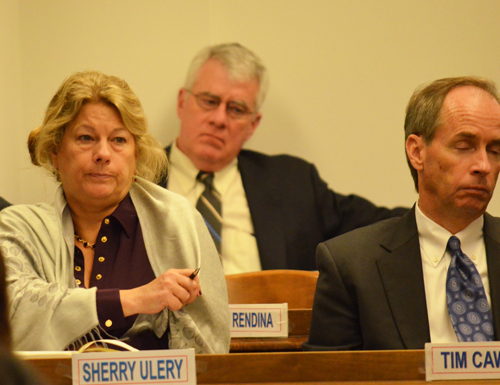 Throughout his time as President of the Chicago Board of Education, David Vitale has routinely voted in favor of hiring executives from out of town (or from corporate America) to top posts in Chicago's public school system. The implication is that under Vitale's "business model" nobody with teaching or school administrative experience from Illinois or Chicago is qualified to run the nation's third largest school system. Among those hired by Vitale's vote were Sherry Ulery (above left), Tom Tyrell (center) and Tim Cawley (right, eyes closed). Ulery, who travelled regularly at Board expense with Barbara Byrd Bennett, was hired (from Ohio) on the recommendation of Barbara Byrd Bennett. Tyrell, a retired Marine officer, was hired at a salary of $180,000 per year to be "Chief Operations Officer" in October 2013 (his job was supposedly to "repurpose" the 49 school buildings the Board had voted to close the previous May; he left in less than two years). Tim Cawley (from Motorola and AUSL) was hired to "Chief Administrative Officer" at a salary of $215,000 per year during Vitale's first meeting as President of the Board of Educaition on June 22, 2011. Ulery is one of the CPS executives who was subpoenaed to appear before the federal grand jury investigating charges against Barbara Byrd Bennett. Cawley has been responsible for many of the worst privatization contracts in CPS history, most recently the Aramark re-privatization contract which has left the schools filthy while CPS proclaims the value of the corporate contract. Vitale voted in favor of both six-figure hirings of Ulery and Cawley. Substance photo by George N. Schmidt. In March, Moody's Investors Service cut its rating on the Board of Education by two notches, to Baa3, or just above junk-bond status, citing CPS' continued use of reserves to pay for operating expenses, including pensions. It was the sixth downgrade since 2011 by the credit rating firm, which the board did not use for its most recent bond offering.
Throughout his time as President of the Chicago Board of Education, David Vitale has routinely voted in favor of hiring executives from out of town (or from corporate America) to top posts in Chicago's public school system. The implication is that under Vitale's "business model" nobody with teaching or school administrative experience from Illinois or Chicago is qualified to run the nation's third largest school system. Among those hired by Vitale's vote were Sherry Ulery (above left), Tom Tyrell (center) and Tim Cawley (right, eyes closed). Ulery, who travelled regularly at Board expense with Barbara Byrd Bennett, was hired (from Ohio) on the recommendation of Barbara Byrd Bennett. Tyrell, a retired Marine officer, was hired at a salary of $180,000 per year to be "Chief Operations Officer" in October 2013 (his job was supposedly to "repurpose" the 49 school buildings the Board had voted to close the previous May; he left in less than two years). Tim Cawley (from Motorola and AUSL) was hired to "Chief Administrative Officer" at a salary of $215,000 per year during Vitale's first meeting as President of the Board of Educaition on June 22, 2011. Ulery is one of the CPS executives who was subpoenaed to appear before the federal grand jury investigating charges against Barbara Byrd Bennett. Cawley has been responsible for many of the worst privatization contracts in CPS history, most recently the Aramark re-privatization contract which has left the schools filthy while CPS proclaims the value of the corporate contract. Vitale voted in favor of both six-figure hirings of Ulery and Cawley. Substance photo by George N. Schmidt. In March, Moody's Investors Service cut its rating on the Board of Education by two notches, to Baa3, or just above junk-bond status, citing CPS' continued use of reserves to pay for operating expenses, including pensions. It was the sixth downgrade since 2011 by the credit rating firm, which the board did not use for its most recent bond offering.
�The financial problems are not pensions alone,� says Paul Vallas, a former CEO of CPS from 1995 to 2001 and now a consultant at Chicago-based DSI Civic Financial Restructuring. �They are addicted to borrowing.�
CRAIN'S ON THE EXPIRATION OF BOARD MEMBERS' TERMS... AND 'POTENTIAL VACANCIES' FOR THE MAYOR TO FILL
May 06, 2015... Emanuel facing decisions on Board of Ed, By THOMAS A. CORFMAN. Crain's on line...
Mayor Rahm Emanuel will have a chance to reshape the Chicago Board of Education in June, when four of the seven members' terms expire.
Emanuel revamped the board in 2011, appointing a fresh slate of new members. Five of those members are still there, having survived the uproar over the decision in 2012 to close 49 schools and one high school program. Last month, some parent groups demanded Emanuel again install an entirely new board, contending that such a step is needed to restore public confidence in the wake of a federal investigation into a no-bid contract the board approved in 2013.
Ald. Patrick O'Connor, 40th, Emanuel's floor leader in the Chicago City Council, says some changes are likely.
�In terms of the city government, we are looking at a little bit of reshuffling in terms of some departments. Not wholesale changes, but kind of a mini-transition,� O'Connor said. �I don't see why the board would be immune from that.�
But William Sampson, an expert in education policy, predicts that dissatisfaction among parents about the board will force Emanuel to make extensive changes.
�He's going to use this investigation to clean house and then pat himself on the back,� said Sampson, chairman of the Public Policy Studies Department at DePaul University. �In a sense it may be a godsend for him because it gives him the political cover to do it.�
An Emanuel spokeswoman declined to comment.
'INSULTED' UNION
The potential vacancies come at a tumultuous time for the board, which in March said it was facing a $1.1 billion budget gap for fiscal 2016. The deficit is driven up by a $688 million pension payment required by state law to partially make up for years of reduced contributions.
CEO Barbara Byrd-Bennett is on leave amid the probe of a $20.5 million contract to Supes Academy, an educational consulting firm where she worked before joining CPS. Jesse Ruiz, an attorney who is vice president of the board, has stepped in as interim CEO. Ruiz and Board President David Vitale, who were appointed in 2011, have terms that run until 2018.
If the deficit and investigation aren't enough, the Chicago Teachers Union contract is up on June 30. Yesterday, the union ripped the board's demand for a 7 percent pay cut, saying it was �insulted� by the offer.
Emanuel isn't required to make any appointments when the terms expire, instead asking current members to hold over.
Among those whose terms expire June 30 is Deborah Quazzo, whose investments in educational technology firms that do business with the Chicago Public Schools have been the subject of several reports in the Chicago Sun-Times.
Those transactions are also the subject of investigation by the CPS inspector general.
Quazzo, founder and managing partner of Chicago-based GSV Advisors, has denied any wrongdoing, saying she has recused herself from board votes when appropriate. She also has offered to donate to charity any profits from her investments. In January, Emanuel expressed his support, saying CPS is �lucky to have her.�
Quazzo's first board meeting was June 26, 2013, when it approved the Supes contract. She declined to comment, according to a CPS spokesman.
SENATE CANDIDATE?
Andrea Zopp's term also expires in June. The president and CEO of the Chicago Urban League is mulling a run for the U.S. Senate in 2016. Zopp, who has served since 2011, did not return a call requesting comment.
Henry Bienen, whose term also expires in June, declined to comment about his interest in a second term, conveying a message via his assistant. �He's not prepared to talk to anyone about this until he's talked to the mayor,� she said.
The president emeritus of Northwestern University has served on the board since 2011.
Carlos Azcoitia, a board member since November 2012, said he is interested in being reappointed when his term expires in June, but has not yet been asked.
�When I was invited the first time, I requested a meeting with the mayor,� said Azcoitia, an education professor at National Louis University. �If I'm invited to be considered again, I'll have another meeting with the mayor.�
In addition to Vitale and Ruiz, Mahalia Hines, a former CPS principal, also has a term that runs until 2018. The mother of hip-hop artist Common and CEO of Chicago-based Think Common Entertainment did not return messages requesting comment.
The board is aware of the potential vacancies, a CPS spokesman said. �The board's focus at this time is working to ensure that the (school) district has the resources it needs to provide a high-quality education to every child in Chicago and to finish the school year on a strong, positive note,� he said in an email.
[GNS: As Rod Estvan shared with Substance: I agree about the Crain's piece. Most of May 5 we spent going over the obscene travel expenses accumulated by Barbara Byrd Bennett (and all paid for by CPS) during the past two years. Note that Byrd Bennett was often traveling with membes of what we are calling her "Ohio Posse" (usually, Sherry Ulery). One thing to remember, though, is that all seven members of the Board (including the two who were replaced -- Pritzker and Sierra) went along with every one of these corrupt deals -- and many more we don't yet know about. The fact that the Board's actions may be technically "legal" makes it all the worse. Like the bankers who got away with the "Synthetic Collateralized Debt Obligations" leading to the 2008 collapse, these people have maneuvered to make legality itself the joke. Sadly, as they repeat again their "billion dollar deficit!!!" claim, the joke is on us...]

